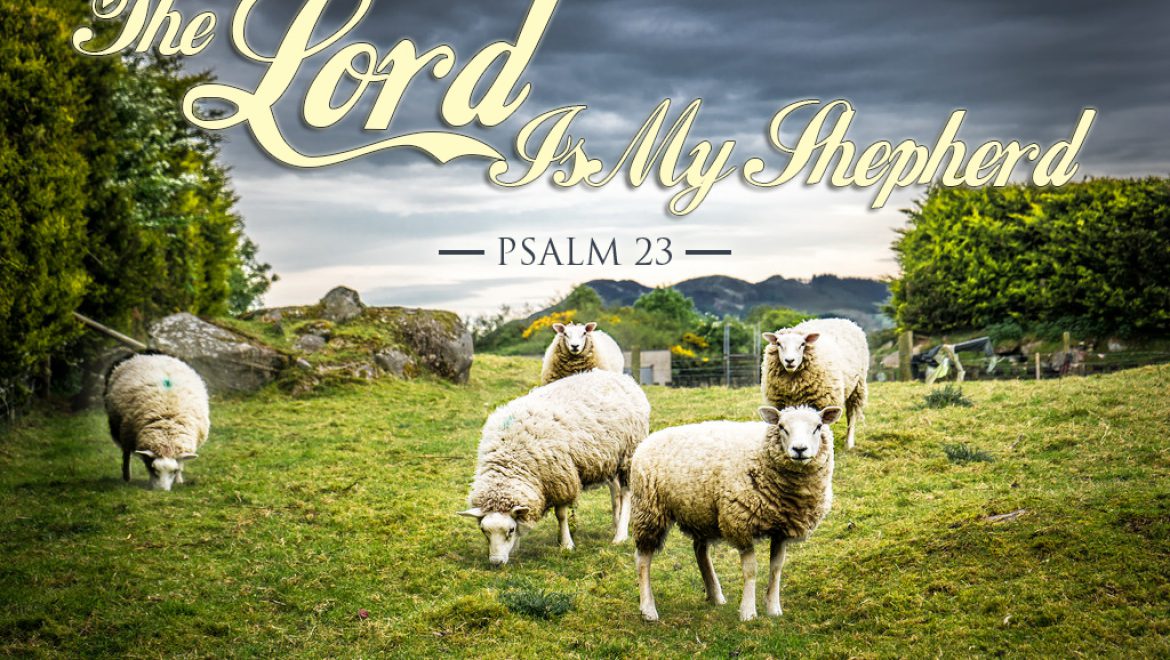
The following article outlines the place of Psalm 23 in Shabbat liturgy in various communities, as well as a literary analysis of several theological and psychological interpretations of the words, according to various thinkers. The author, Rabbi Peretz A. Rodman, is an American-born, Jerusalem-based rabbi, educator, writer, and translator affiliated with the Masorti (Conservative) community. This resource also includes the text of the Psalm in English and Hebrew, a video tutorial demonstrating how to recite the Psalm in Hebrew, as well as videos of a popular Askhenazi tune and a traditional Yemenite chanting of the Psalm.
Psalm 23 and Kiddush on Shabbat by Rabbi Peretz A. Rodman
The opening cadences of Psalm 23 in the King James Version, “The Lord is my shepherd; I shall not want…,” are as well-known to speakers of English as the most famous lines of Shakespeare. Literary critic Mark Van Doren called it “the most famous of all the psalms.” Commonly associated with funeral orations, in Jewish practice the psalm is also part of the Shabbat liturgy. In the practice of many communities of Middle Eastern or North African provenance, it is sung prior to both the evening and daytime Kiddush, and among many Hasidim, it is recited after the daytime Kiddush. In many Ashkenazi communities, it accompanies the third Shabbat meal. How can the same text be appropriate for both mourning the dead and celebrating “the most pleasant of days”?
The answer lies in the poem’s message of reassurance, present in such lines as “Surely goodness and mercy shall follow me all the days of my life…” (v.6). This is so despite the psalm’s prescription to let go of the notion that we are navigating our own paths in the world. “The psalm,” Rabbi (and literature professor) Miriyam Glazer observes, “beckons us—who are so accustomed to seeing ourselves as ‘captains of our ship, masters of our fate,’ in charge of our own lives—to let go, to surrender the burden of, and our need for, control.” To whom do we entrust our fate? To God. And as Van Doren notes, “the Lord is represented [in this Psalm] not only as a friend and guide, but literally as counselor or teacher.” What better guidance and protection could one hope for? And this protection is eternal: “… and I shall dwell in the house of the Lord for ever” (v. 6).
The theme of the second half of the Psalm, too, is appropriate for both sorts of occasions. We walk ‘in the valley of the shadow of death’ (again, that’s King James) and enjoy the bounty from a table set up for us by God. The “table,” Glazer suggests, “that God sets up for us, in the face of our ‘enemies’—in the face of all our fears, anxieties, worries, soul-sapping concerns […]—that ‘table’ is the space for holiness that we open within ourselves. Whether we are responding to loss or celebrating the holiness in time that Shabbat offers us, this poem can help us create, or tap into, as awareness of our being loved, protected, and offered much-needed solace and rest. This is not, Israeli poet Hamutal Bar-Yosef observes, the sentiment of a child but a tranquility “achieved after difficult experiences, through which the poet has found God.”
In his popular novel Adjusting Sights, Israeli rabbi Haim Sabato shows how the connection to Shabbat can imbue the psalm with further emotional valence. A character there, a soldier living through the deadly Syrian advance in the first days of the 1973 Yom Kippur War, says, “I felt the pocket of my shirt. There was a small book of Psalms there.” He opens to Psalm 23. “It was the song my father sang before the Kiddush over wine after coming home from synagogue on Sabbath mornings. His melody was soothing. I had always associated it with the tranquility that graced the world on Sabbath mornings.” The content of the Psalm blends with its liturgical setting to form an even stronger message of reassurance in a moment of crisis.
Texts
Here is the full text of Psalm 23 in Hebrew and English (King James Bible translation):
א מִזְמוֹר לְדָוִד: יְהוָה רֹעִי, לֹא אֶחְסָר.
ב בִּנְאוֹת דֶּשֶׁא, יַרְבִּיצֵנִי; עַל-מֵי מְנֻחוֹת יְנַהֲלֵנִי.
ג נַפְשִׁי יְשׁוֹבֵב; יַנְחֵנִי בְמַעְגְּלֵי-צֶדֶק, לְמַעַן שְׁמוֹ.
ד גַּם כִּי-אֵלֵךְ בְּגֵיא צַלְמָוֶת, לֹא-אִירָא רָע– כִּי-אַתָּה עִמָּדִי;
שִׁבְטְךָ וּמִשְׁעַנְתֶּךָ, הֵמָּה יְנַחֲמֻנִי.
ה תַּעֲרֹךְ לְפָנַי, שֻׁלְחָן– נֶגֶד צֹרְרָי;
דִּשַּׁנְתָּ בַשֶּׁמֶן רֹאשִׁי, כּוֹסִי רְוָיָה.
ו אַךְ, טוֹב וָחֶסֶד יִרְדְּפוּנִי– כָּל-יְמֵי חַיָּי;
וְשַׁבְתִּי בְּבֵית-יְהוָה, לְאֹרֶךְ יָמִים.
23 The Lord is my shepherd; I shall not want.
2 He maketh me to lie down in green pastures: he leadeth me beside the still waters.
3 He restoreth my soul: he leadeth me in the paths of righteousness for his name’s sake.
4 Yea, though I walk through the valley of the shadow of death, I will fear no evil: for thou art with me; thy rod and thy staff they comfort me.
5 Thou preparest a table before me in the presence of mine enemies: thou anointest my head with oil; my cup runneth over.
6 Surely goodness and mercy shall follow me all the days of my life: and I will dwell in the house of the Lord for ever.
Additional Resources
To learn to recite Psalm 23 in Hebrew with word-by-word pronunciation and on-screen Hebrew, English, and transliteration, see this video tutorial from The Word in Hebrew.
To hear an interpretation of Psalm 23 from Reb Zalman Schachter, founder of the Jewish Renewal movement:
To hear a popular melody for Psalm 23 in Hebrew composed in 1946 by Ben Zion Shenker (USA, 1925–2016) and performed by Israeli singer, Ehud Banai:


